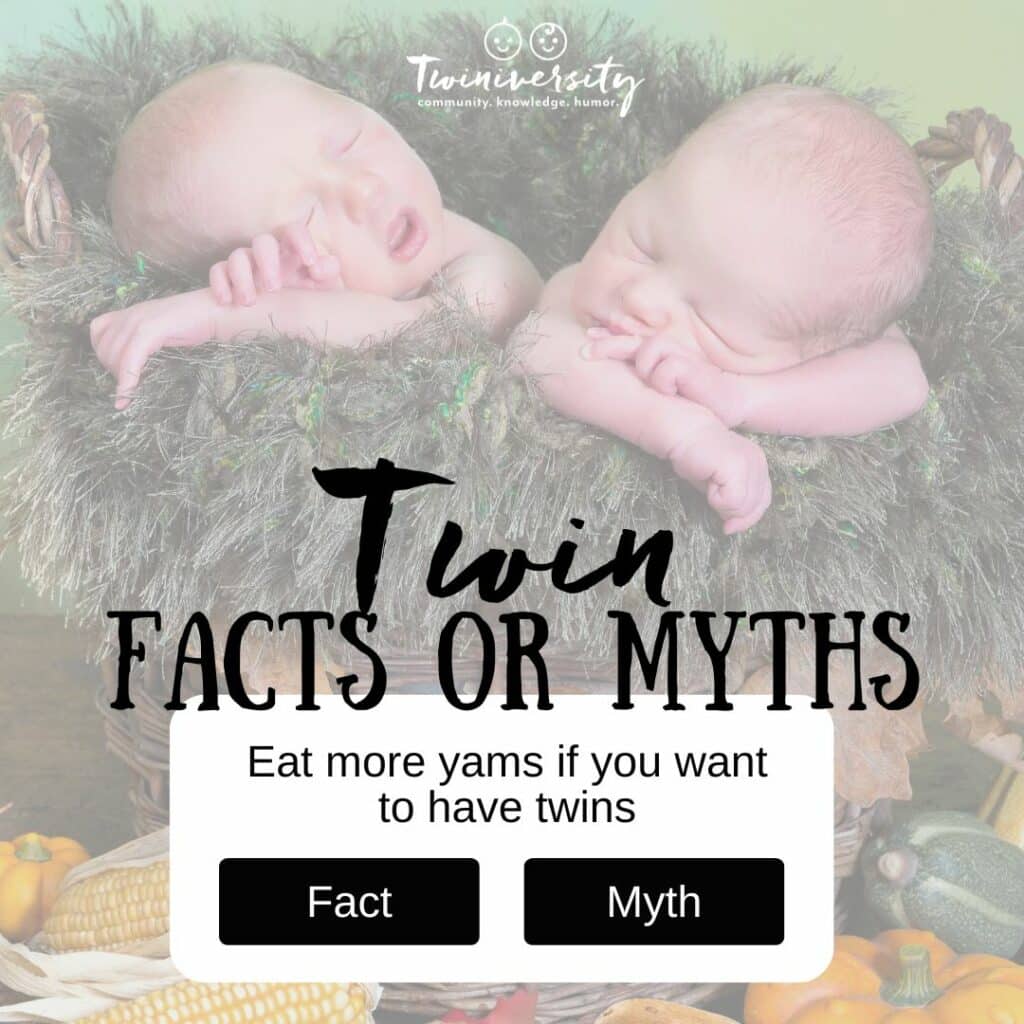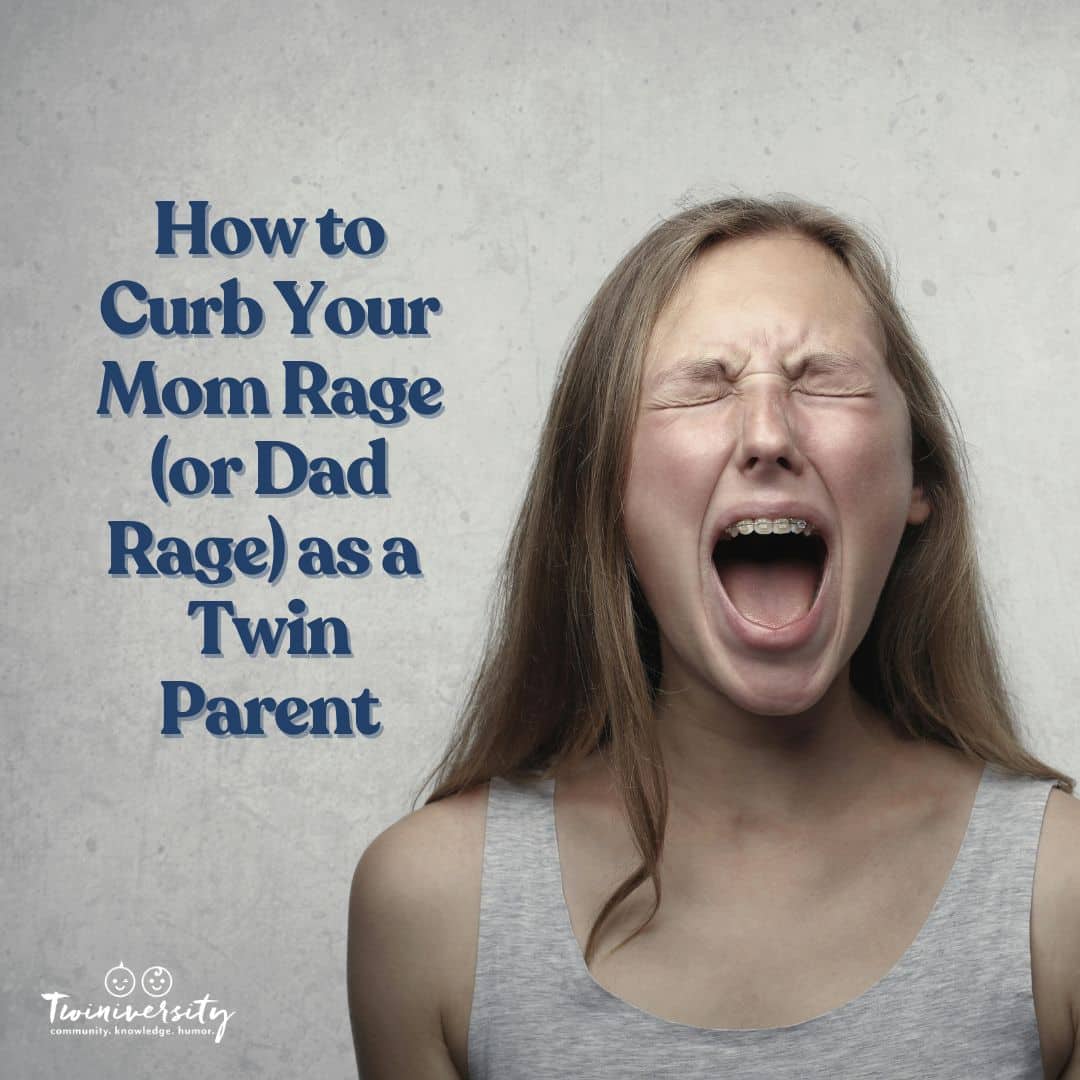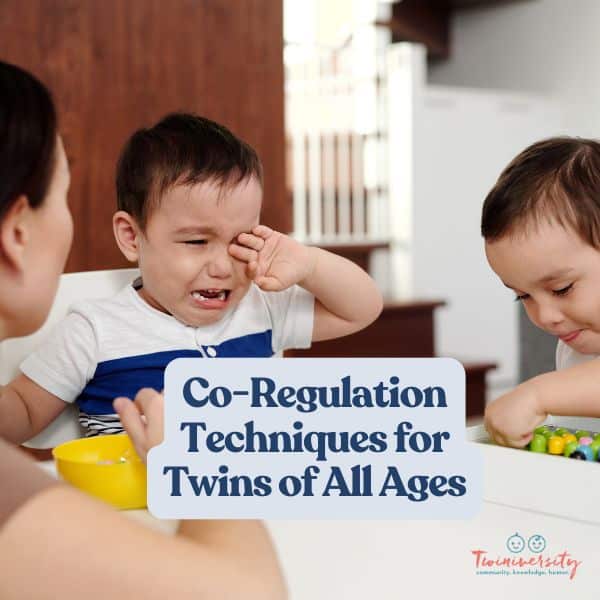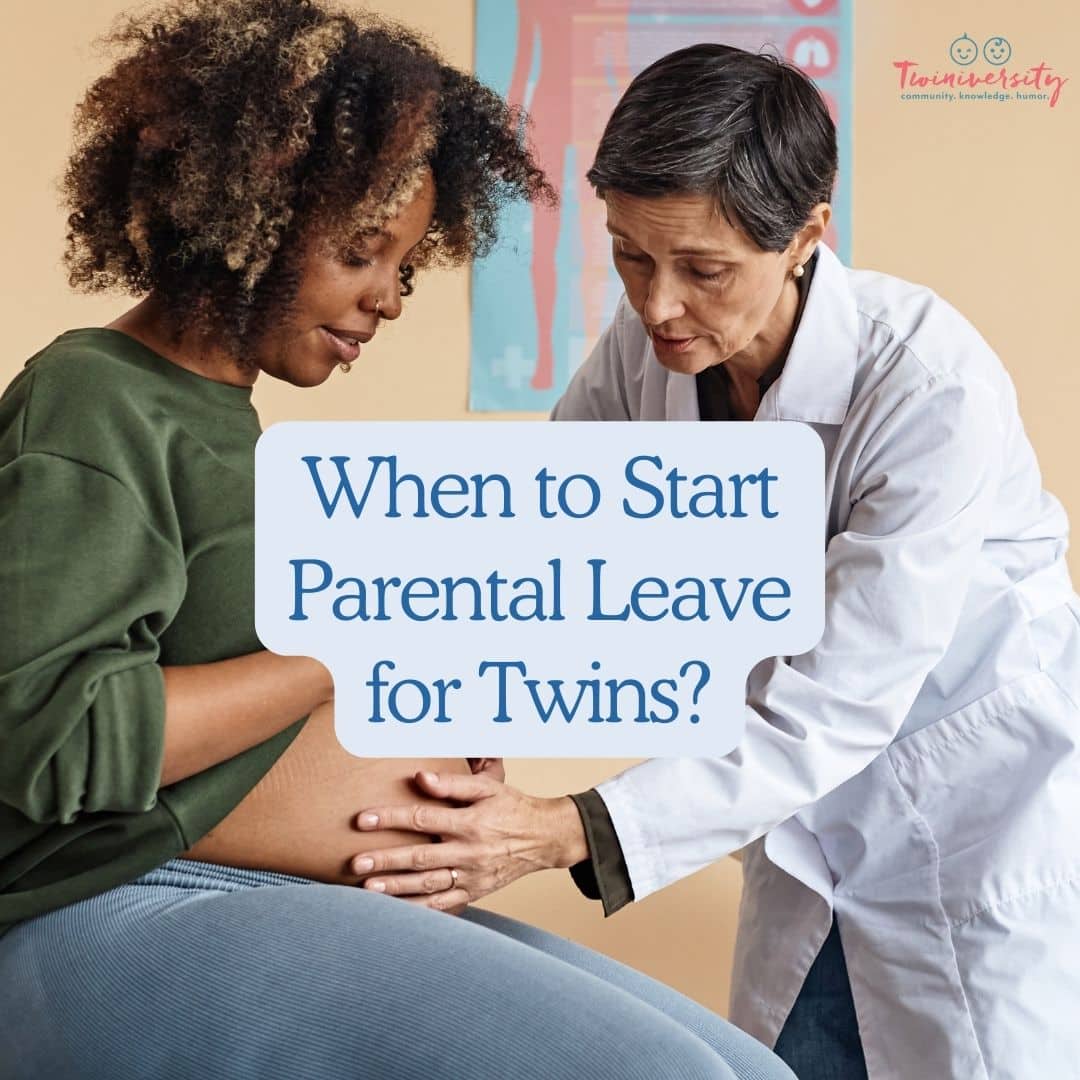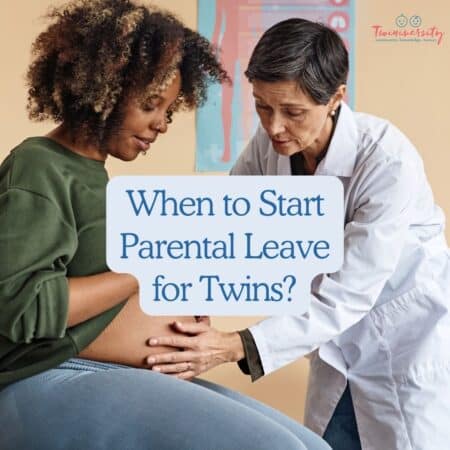Last updated on March 20th, 2024 at 03:50 pm
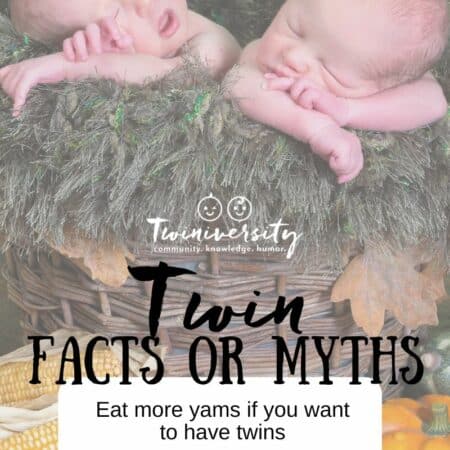
Twins can be a source of fascination, mystery, and speculation. From the moment they’re born, twins capture the public’s attention with questions about their similarities and differences. Making myths and misconceptions a common occurrence when talking about twins. So, what’s actually true and what’s not? Keep reading to see what we can debunk about twin facts and myths.
“Are they twins?” is definitely the first question every MoM gets asked. Next would be, “Do twins run in your family?” (in my case, yes) and “Are they identical?” (even if one is covered in pink and the other in blue). So many generalizations and questions get tossed around about twins, so let’s talk about which ones are facts and which ones are myths.
FACT or MYTH: Twins come from the father’s side
MYTH: It’s the MOM’s side that really matters. If the twin gene pool is within your mom’s family tree, chances double for double. My doctor’s office told me that fun fact when I found out we were having twins.
FACT or MYTH: Twins are only truly twins if they share a birthday
MYTH: They are still twins. According to Webster’s dictionary, a twin is “either of two offspring produced in the same pregnancy.” Your body physically carries out the growth of two fertilized eggs at the same time.
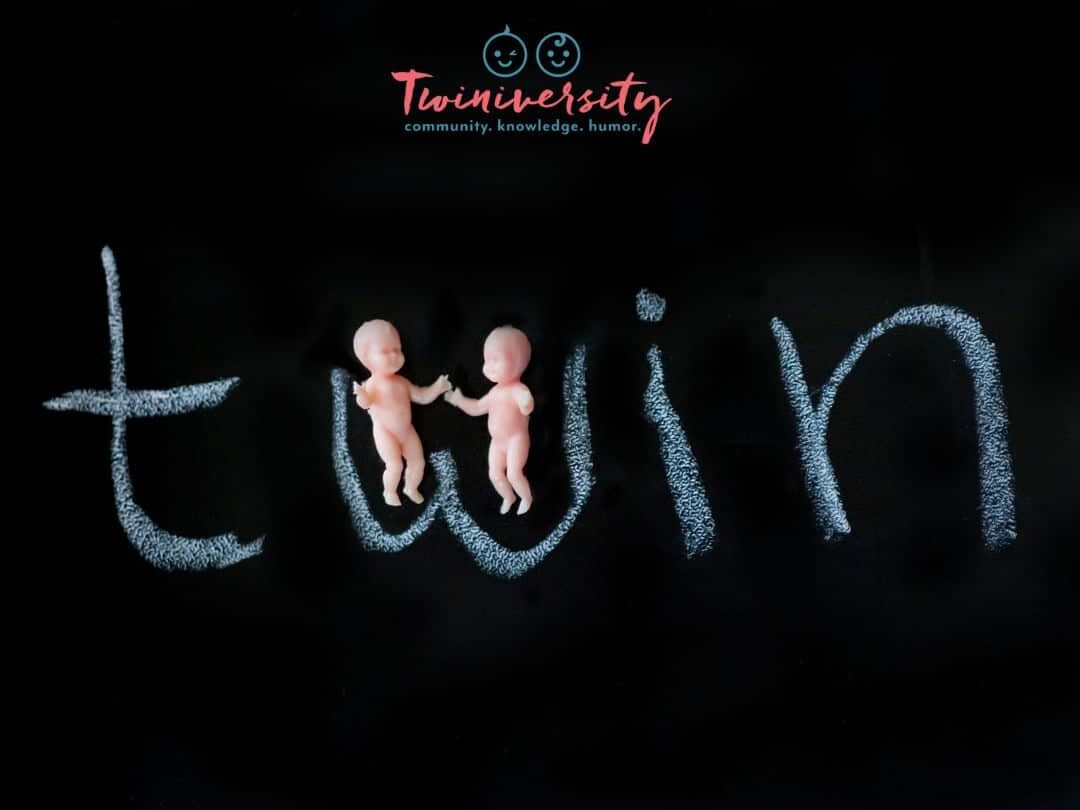
SIDE NOTE: This was my motivation to push when I saw the clock strike 11 p.m. I was telling my twins in my belly, “No way am I going to have to explain why you have two birthdays, so you both better come out on the same day.” 😂
FACT or MYTH: Twins skip a generation
MYTH: I love a good WebMD article, and this is what they said: Chances of conceiving twins increase when your mom’s side of the family tree has twins, but it doesn’t mean it’ll skip a generation exactly.
This is certainly not an exact science! And, although there isn’t an exact algorithm for when twins pop up in the generation, you do have a higher probability of having twins if you have twins in the family tree.
This brings me to my next one….
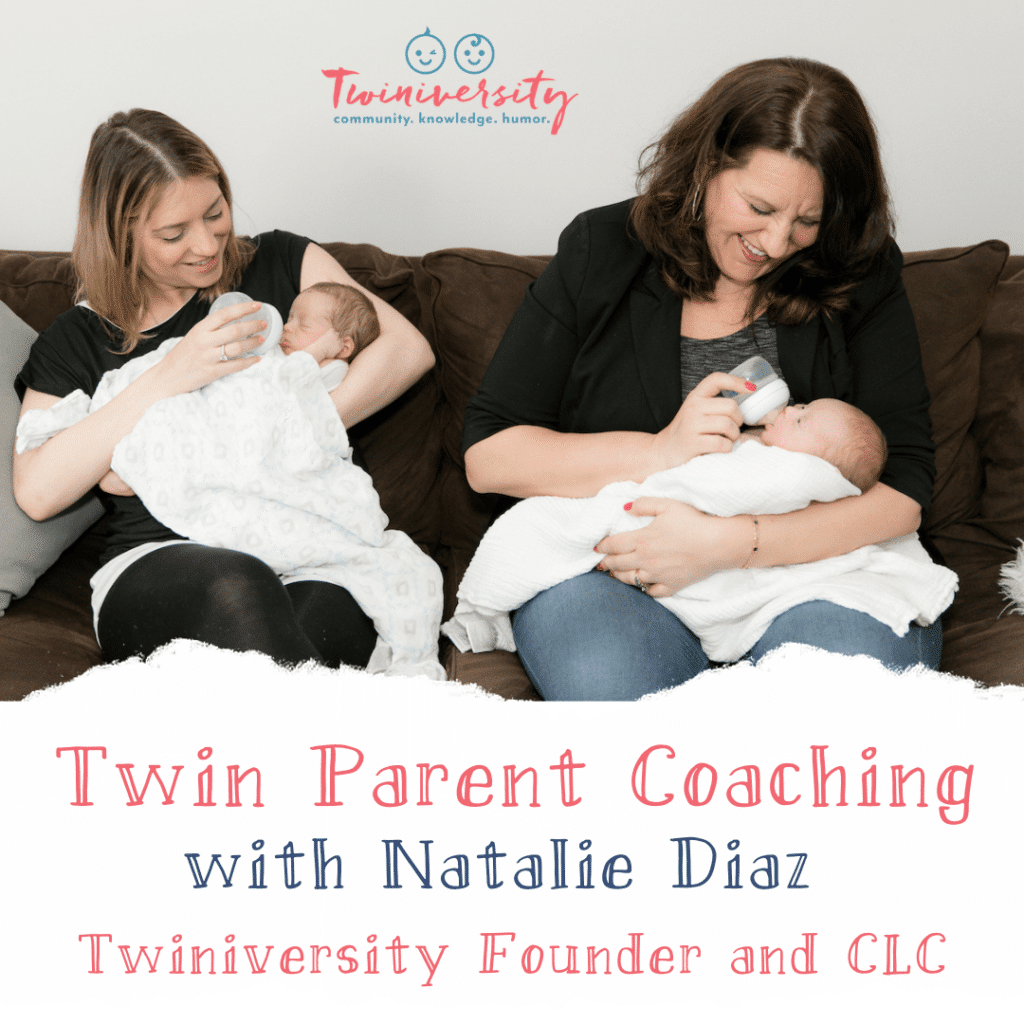
Have you taken your expecting twins class yet? We offer a great class on demand so you can take it on your own schedule! There are so many video modules covering everything from your twins’ baby registry to your first week at home with twins!
Sign up today to get started before your twins arrive.
FACT or MYTH: Twins are hereditary
FACT: YES! Twins are hereditary… fraternal twins only, though.
FACT or MYTH: Twins means double the work
FACT-ish: From experience, I wouldn’t say it’s not exactly double. Yes, in theory, it sounds like there would be double: double diapers, double bottles, and double feedings. The best way to paint the picture is by creating a scene. In a 1 child to 2 parent ratio, you have that tag-in support so one person can wash bottles, do laundry, and take a nap while the other takes care of their baby. With families of multiples… there’s no tagging out. You’re all in with your partner running at max at all times while trying to squeeze in time to do the above household chores.
In time, I’ve been told by my mother-in-law and my aunt (both are MoMs), that it gets easier. My twins are only 20 months old, so we’re still in the thick of it. But looking back… it’s definitely easier than the newborn stage. There are tons of reading materials out there to help you prepare. Check out What To Do When Expecting Two by Twiniversity CEO, Natalie Diaz.
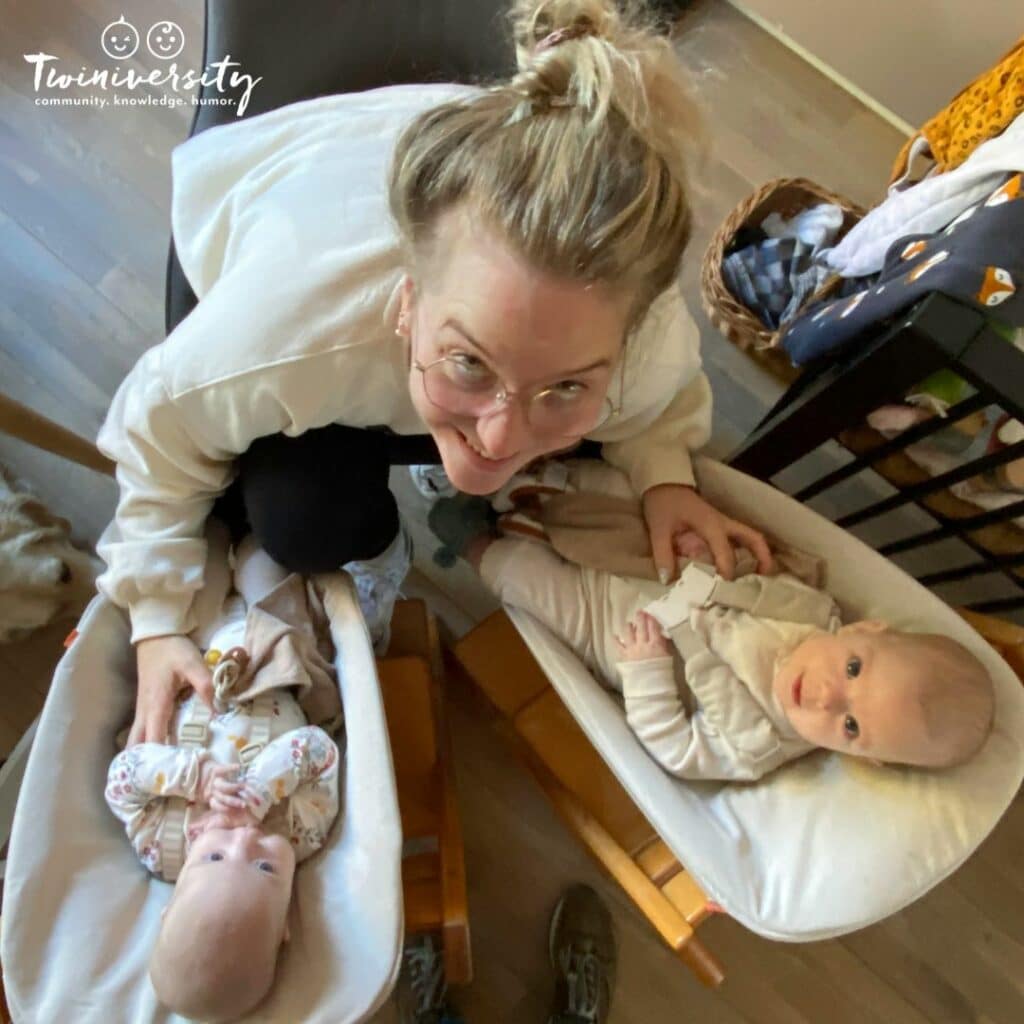
FACT or MYTH: If you have one set of twins, you are more likely to have another set of twins
FACT. The answer is yes, you can! Women who have already had one set of twins are more likely to have another set of twins than women who haven’t. While the exact statistics vary from study to study, it is generally accepted that a woman who has had one set of fraternal twins has a 4-6% chance of having another set (fraternal twins will have a 1 in 17 chance of having another set). If you have identical twins, the chances of identical twins again decrease to about 1 in 70.
FACT or MYTH: Do twins speak their own language
FACT-ish. In most articles I read, everybody says it’s kinda true. According to The Bump, “(it is) fairly rare for (twins) to develop their own complete language — in most cases, it’s just repetitive babble.”
My daycare teacher told me that Carter was reaching for milk and fussing because he couldn’t quite get his cup. Thankfully, his twin, Zach, understood the grunting and crying and passed his milk over to him. Call it language; call it intuition. Whatever it is… your twins might always have communication that no one will ever understand but them.
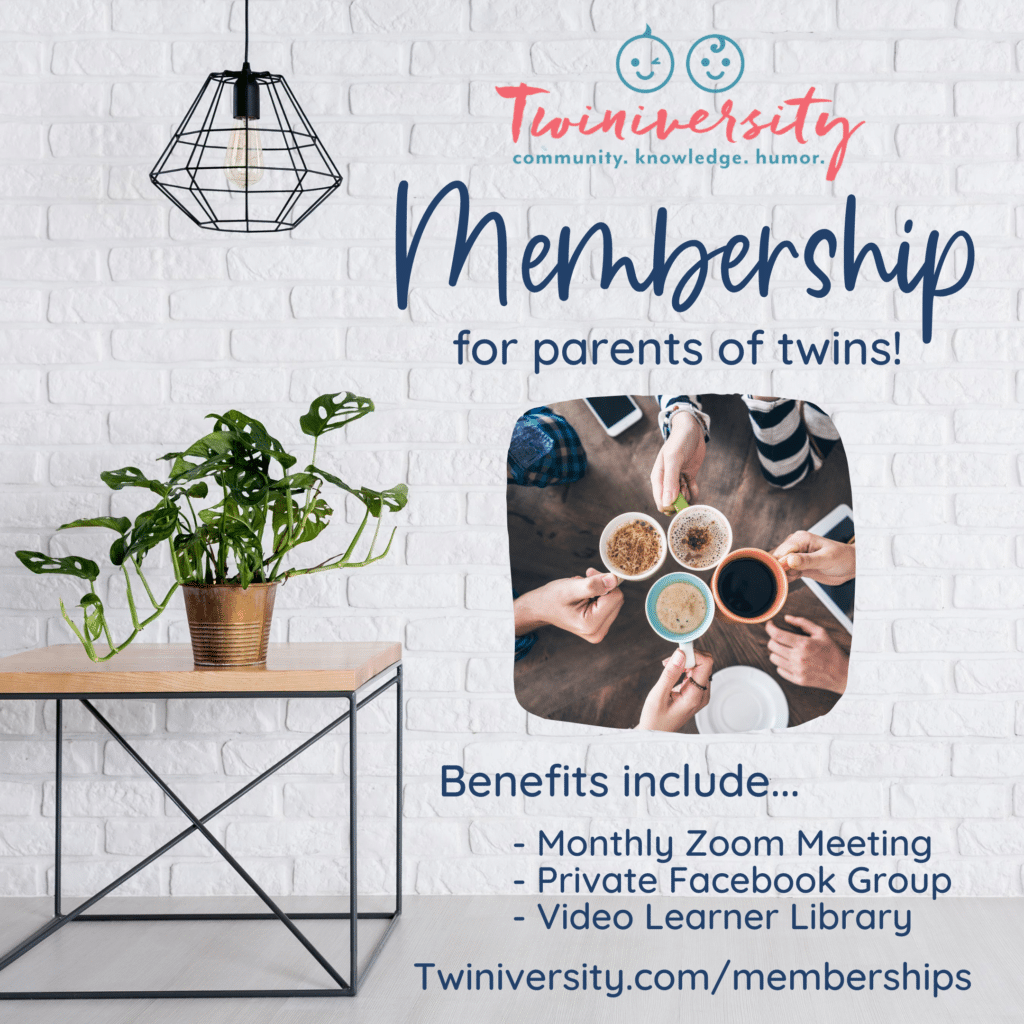
Need some twin parent friends? Get the support you need with a Twiniversity Membership. Benefits include a monthly twin parent club meeting on Zoom, access to a private Facebook group just for twin parents, and a video library of twin parenting lessons. Visit Twiniversity.com/membership to join today!
FACT or MYTH: You have to eat double the caloric intake when pregnant with twins
MYTH. Pregnant women carrying twins do need to increase their caloric intake in comparison to those carrying one baby, but the amount of calories needed is not double. The recommendation for a single pregnancy is an additional 300-400 calories per day, while pregnant women with twins should aim for an additional 500-600 calories per day. My doctor had me on a 100g of Protein diet per day. Do you realize how hard that was when your aversion during pregnancy is meat?
FACT or MYTH: One twin will be born bad, and the other will be good
MYTH. This is a myth that has been around for centuries, but it has no scientific basis. In fact, twins are likely to have similar personalities and interests even though they may have different temperaments or behavioral styles. Just like any siblings, some differences do exist between them, but they are not born one “good” and one “bad.”

FACT or MYTH: Eat more yams if you want to have twins
MYTH with facts. According to a Yale study, eating more yams could cause hyperovulation. The study stems from the Yoruba tribe, which is known to have the highest twin birth rate in the world, and their primary food source is yam. The jury is still out there whether or not this is true.
FACT or MYTH: You can’t exclusively breastfeed twins
MYTH. Many mothers successfully breastfeed twins. It may require a lot of dedication and support due to the increased demand. Consulting a lactation expert can be helpful for mothers of twins to establish and maintain exclusive breastfeeding.
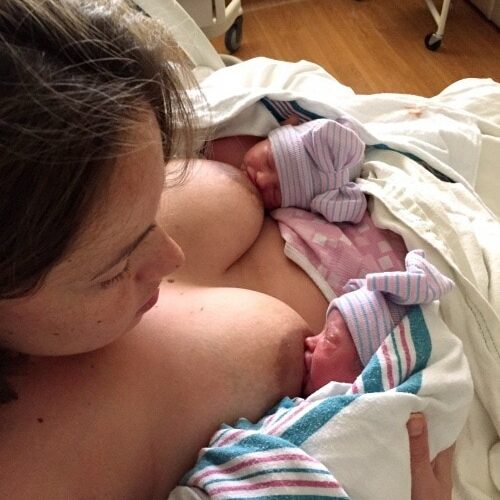
FACT or MYTH: Identical twins can be boy and girl
MYTH. Identical twins mean the fertilized egg split in two. Because the already fertilized egg split in two, both babies will be the same gender.
FACT or MYTH: Morning sickness is extreme in twin pregnancies
FACT. According to WebMD, morning sickness may be worse with twin pregnancies. This is because the higher levels of hormones in twin pregnancies can lead to increased nausea and vomiting. However, the severity of morning sickness can vary from person to person, and not all twin pregnancies will experience extreme morning sickness.
FACT or MYTH: Older women are more likely to have twins
FACT. Women who are 35+ have a higher probability of having twins, says the Mayo Clinic. The older you get, the more likely you are to double ovulate. And what does that mean? Two fertilized eggs = fraternal twins! Wild!
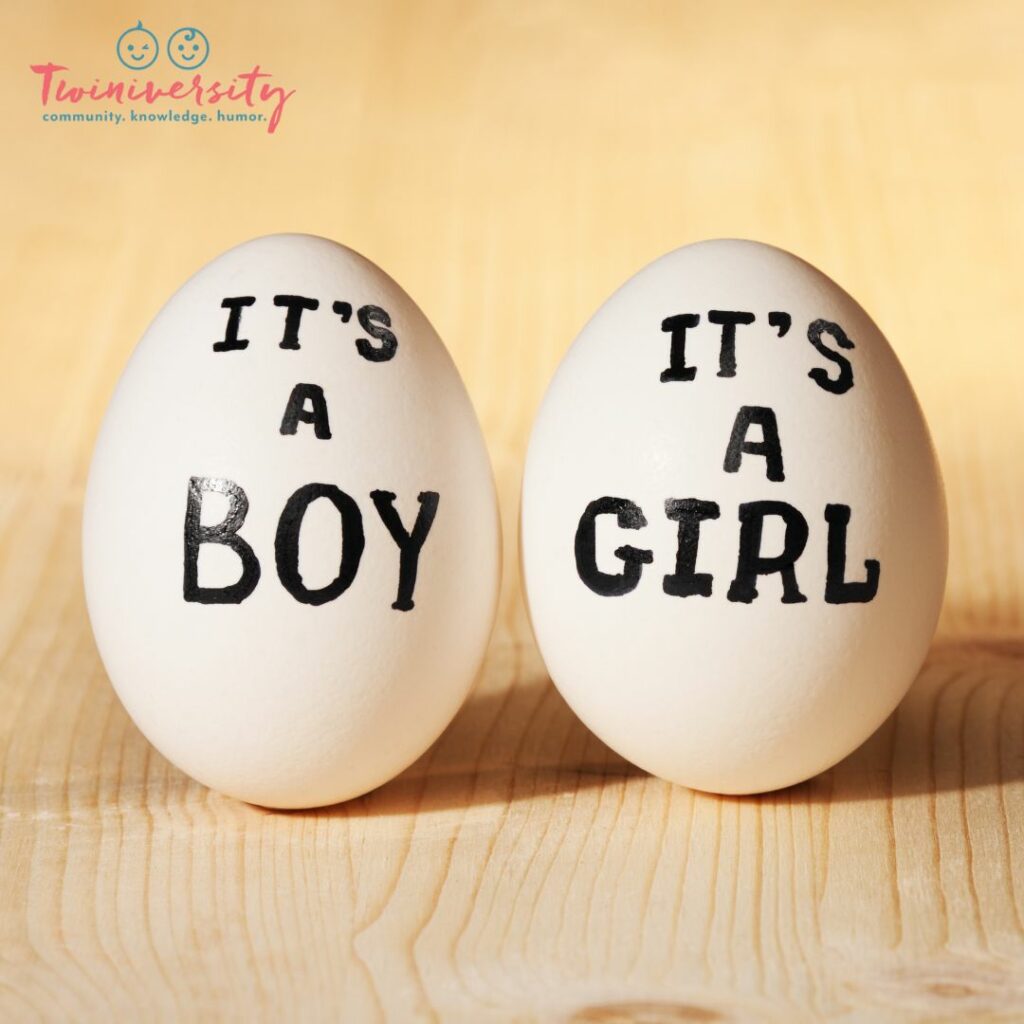
FACT or MYTH: Twins mean the same
MYTH. Although twins often look alike (or look the same; identical twins), the true twin fact is they are actually unique individuals with their own personalities. I was very lucky to have grown up in a family with identical twin cousins and married into a family with identical twin sisters, so I feel I had a better understanding of twins when I had my own. Let me tell you. The two twins (cousin and sister-in-law) have very different personalities, styles, mannerisms, etc. Sure, there are some things that overlap, such as their shoe size or the color of their hair, but my one cousin likes to bake and meal prep while the other prefers to use GrubHub. Psychology Today says it best: “Creating and developing individuality is the foundation for long-range overall mental and physical wellness for twins.” So, no, twins do not mean the same.
FACT or MYTH: Twin pregnancy will make you gain a lot of weight
MYTH. Your doctor will tell you if you’re going out of bounds with your diet, but weight gain is normal in pregnancy. You have to gain weight cause your babies are growing. Wouldn’t it be more concerning if you weren’t gaining weight when your body is physically growing two new forms of life? According to DailyMom, a woman pregnant with two should gain about a pound and a half per week.
FACT or Myth: Twin pregnancy can come with lots of complications
FACT. Twin pregnancies can come with more complications than singleton pregnancies, including an increased risk for preterm labor and delivery, premature rupture of membranes, and gestational diabetes. Just because you have an increased risk of these complications doesn’t mean you will have them. Plenty of twin pregnancies have little to no complications.
FACT or Myth: You can tell Identical Twins apart by their Belly Buttons
FACTish. Identical twins do not necessarily have identical belly buttons. The appearance of a belly button is influenced by factors such as how the umbilical cord is cut and how it heals, so there is a chance they could have identical belly buttons.

FACT or MYTH: You can’t sleep train twins in the same room
MYTH. It’s definitely possible. My twins were sleep-trained in the same room, and my friend also sleep-trained her fraternal twin girls in the same room. Sleep training is a personal choice, a choice we made after consulting with our pediatrician. By sleep training in the same room, the twins adapted and learned to sleep through each other’s cries. Now they can’t sleep without having each other in the same room.
FACT or MYTH: Twin Telepathy is Real
FACTish. Many people talk about twin telepathy, but scientists haven’t found much solid proof for it. However, twins often report an intuitive understanding of each other and may communicate nonverbally through subtle cues and shared experiences.
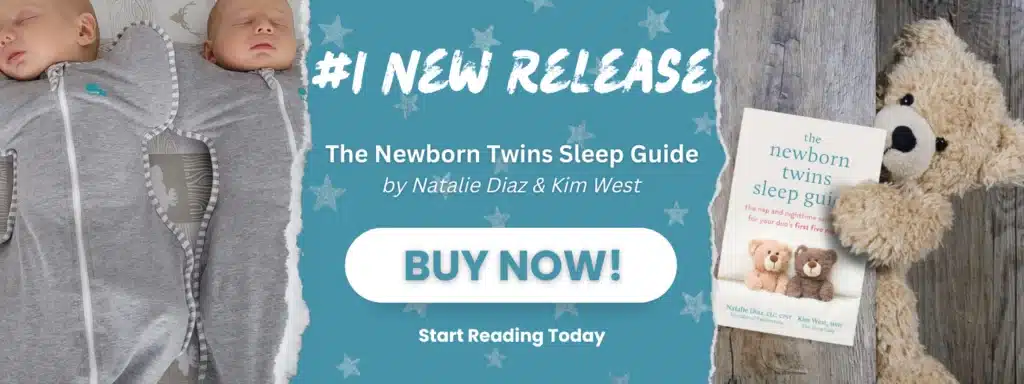
FACT or MYTH: All Twins Have the Same Developmental Milestones
MYTH. While twins may reach some developmental milestones at similar times, they do not always progress at the same rate.
FACT or MYTH: Identical Twins Share 100% of Their DNA
FACT: Identical twins share 100% of their genetic material and often have striking physical similarities, including identical DNA sequences. They may also exhibit similar personality traits and mannerisms, even if raised apart.
FACT or MYTH: Twins Can Feel Each Other’s Physical Sensations
MYTH. Despite anecdotal accounts of twins claiming to feel each other’s pain or sensations, there is no scientific evidence to support this belief. Twins may empathize with each other, but they cannot physically feel each other’s sensations.

FACT or MYTH: Twins Live Longer
FACT. Research from the University of Washington has shown that twins tend to live longer than the general population. Researchers attribute this to the close social support and companionship they provide each other throughout life. Additionally, the genetic factors that contribute to twinning may also confer health benefits that promote longevity.
FACT or MYTH: Twins Have the Same DNA
MYTH. While identical twins share nearly identical DNA sequences because they originate from the same fertilized egg, they may still have slight genetic differences due to mutations that occur after the split. Additionally, fraternal twins have different DNA, just like any other siblings.
FACT or MYTH: Twins Have Identical Fingerprints
MYTH. While identical twins share the same genetic makeup, they do not have identical fingerprints. Fingerprints are influenced by both genetic and environmental factors, resulting in unique patterns even among identical twins.
FACT or MYTH: Twin Birth Rates are Rising Due to IVF
FACT: Twin birth rates have increased due to the use of fertility treatments like IVF, which can lead to a higher likelihood of multiple births.

FACT or MYTH: Twins Have the Same Blood Type
MYTH. While twins may share some genetic traits, including blood type, they do not always have identical blood types.
FACT or MYTH: Twin Pregnancies Have a Longer Labor Duration
FACT. Labor for women carrying twins is often longer compared to those with singleton pregnancies. This is because the uterus needs to contract more forcefully to expel two babies, and the second twin may be in a less favorable position for delivery.
FACT or MYTH: Pregnant with Twins Means More Ultrasounds
FACT. Twin pregnancies often require more frequent ultrasounds to monitor the growth and development of both fetuses, assess the health of the placenta(s), and detect any potential complications such as twin-to-twin transfusion syndrome.
Twins can be a source of fascination and mystery, but there are also a lot of myths surrounding them. We hope that this article has helped to shed some light on some twin facts and myths so that you can make up your own mind about what is true and what is not.

Stephanie Miller is the proud mom of twin cyclones Zach and Carter (20-month-old). Every day in the Miller house, you’ll find rooms turned over, floors covered in bits of Lego and puzzle pieces (mind your step), and the sound of “Brown Bear Brown Bear” read over and over, and over again. You’ll typically find her being used as the seat to reading time for the two bookworms, covered in bubble solution as they try to excel in their Bubble Wand skills, or being the voice to command Alexa for their favorite tunes. She and her husband are working on their traveling skills cause she can’t wait to show them the amazing world that is out there for them.

